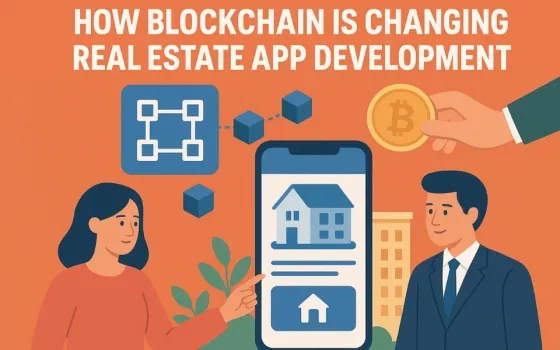Blockchain technology is rapidly transforming the real estate sector, introducing transparency, efficiency and trust into an industry long dominated by complex paperwork and slow transactional processes. Its integration into real estate app development enables secure property records, automated contract execution and more efficient verification of ownership. By decentralising data and eliminating many intermediaries, blockchain lowers operational costs while improving user confidence. The technology is also powering fractional ownership platforms, digital property tokens and enhanced due-diligence systems. As developers and investors adopt blockchain-driven tools, the real estate ecosystem is becoming more accessible, data-rich and technologically resilient, signalling a long-term shift in how property is bought and sold.
A New Digital Foundation for Real Estate
Real estate transactions often involve multiple stakeholders, lengthy documentation and layers of verification. Blockchain—through decentralized, tamper-resistant data structures—simplifies many of these processes. Each transaction block is securely recorded, enabling real estate apps to provide verifiable, traceable and immutable property information. This reduces fraud risks and brings new levels of clarity to property histories, valuations and ownership trails.
Developers designing next-generation real estate applications increasingly rely on blockchain as a foundational layer to streamline these interactions and boost user trust.
Smart Contracts: Automating Property Transactions
One of the most transformative blockchain features in real estate app development is the use of smart contracts—self-executing agreements programmed to operate when predefined conditions are met.
These contracts eliminate many manual steps associated with property sales, rentals and lease renewals.
For example:
- Payments can be released automatically upon inspection approval.
- Ownership rights can be transferred instantly once conditions are validated on-chain.
- Rental agreements can execute recurring payments without intermediaries.
The result is a faster, more efficient transactional cycle with fewer errors and reduced administrative costs.
Enhancing Fraud Prevention and Data Transparency
Real estate has historically been vulnerable to title fraud, misrepresented ownership and manipulated records. Blockchain solves these challenges by storing data on decentralized ledgers that cannot be altered retroactively.
Real estate apps empowered by blockchain can:
- Provide real-time access to verified property records
- Track amendments to ownership history
- Detect discrepancies in documentation
- Reduce reliance on manual verification
This elevated transparency strengthens user confidence and positions blockchain-based platforms as more secure alternatives to conventional systems.
Tokenization: Opening the Door to Fractional Ownership
One of blockchain’s most groundbreaking contributions is the tokenization of physical assets. Real estate apps can now represent property ownership in the form of digital tokens, allowing investors to purchase fractional shares rather than entire properties.
This trend is reshaping investment models:
- Lower entry costs expand opportunities for small investors
- Property portfolios can be diversified more efficiently
- Tokenized assets provide increased liquidity compared to traditional real estate
For developers, enabling tokenization features within apps unlocks entirely new revenue streams and user segments.
Improving Efficiency in Property Management
Blockchain is not limited to buying and selling. Its benefits extend through the entire property management lifecycle. Apps linked with blockchain can automate maintenance logs, track rental payments, verify tenant documents and store warranties or past service records.
Landlords, tenants and property managers all benefit from smoother communication, faster dispute resolution and accessible records.
The Future of Real Estate App Development
As blockchain continues to mature, its role in real estate app development will expand even further. Future applications may include decentralized lending for mortgages, cross-border property transactions without currency friction, AI-enhanced asset evaluations using blockchain data, and integration with metaverse or digital-twin environments.
Regulatory frameworks are evolving, and as they solidify, developers will gain more clarity and flexibility in designing compliant, blockchain-enabled products.
Conclusion
Blockchain is no longer an experimental technology in real estate—it is becoming an industry standard. Its ability to increase transparency, reduce fraud, streamline transactions and democratize property investment positions it at the center of future real estate innovation. Apps built on blockchain foundations will define the next era of property technology, offering a more efficient, inclusive and trustworthy experience for buyers, sellers, investors and managers alike.
